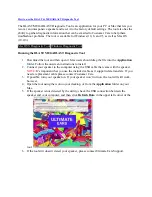
9
2210-00
60706-237
FROM LP/NG TO GASOLINE
1. With the engine running turn off the LP/NG
fuel supply.
2. Run the engine until it runs out of fuel.
3. Remove the flexible fuel line from the de
-
mand regulator.
4. Reinstall the plastic plug in the regulator.
5. Check to be sure the gasoline fuel valve is
off.
6. Fill the gasoline fuel tank.
7. Turn on the gasoline fuel valve.
8. Start the engine.
BATTERY INSTALLATION
This engine generator set is shipped with a battery tie
down kit for customer installation. This kit consists of
a battery tie down and hardware for installation of the
customer supplied battery on the unit. If you intend
to use the power plant’s electric start system, you will
need to purchase and install a battery to operate it.
Units equipped with a recoil or rope start will operate
satisfactorily on gasoline without a battery but stating
on LP/NG requires electric start be used.
WARNING: EQUIPMENT DAMAGE
The battery positive (+) cable is shipped with a
plastic protective cap. When starting manually, this
protective cap must remain in place to avoid pos-
sible damage to the engine electrical system and/or
generator end.
A 12-volt powersports (motorcycle/atv/snowmo-
bile) battery,
BCI group 20 or 24HL rated at 300
CCA
or larger is recommended for this electric start
engine generator set. Maximum length: 8 1/8”,
Maximum width: 3 9/16”, Height range: 5 3/4” - 7”.
Amp Hours: 15AH or greater. Follow the battery
manufacturers recommendations for servicing and
charging prior to use. Connect the battery to the elec-
tric start system using the cables provided.
CAUTION: EQUIPMENT DAMAGE
These electric start engines are NEGATIVE
GROUND. Use extreme caution when connecting the
battery. Connect the NEGATIVE battery terminal to
GROUND.
For your safety always connect the positive battery
cable to the “bat+” terminal first. Then connect the
negative battery cable to the “bat-” terminal. Make
sure all connections are clean and tight. Reverse the
sequence when disconnecting, disconnect the nega-
tive cable first. These engines produce enough direct
current to keep a battery charged under normal oper-
ating conditions, but were not intended to be used as
a battery charger.
WARNING: PERSONAL INJURY
Lead acid batteries produce explosive hydro-
gen gas when charging. Keep sparks, flames, and
burning cigarettes away from the battery. Ventilate
the area when charging or using the battery in an
enclosed space. Lead acid batteries contain sulfuric
acid, which causes severe burns. If acid contacts
eyes, skin or clothing, flush well with water. For con-
tact with eyes, get immediate medical attention.
BATTERY CHARGING
Units equipped with electric start have a small fly
-
wheel charger built into the engine flywheel assembly
for recharging the starting battery. This flywheel char
-
ger generates a small AC current that passes through
a diode assembly to produce a DC charging current
of about 1 to 3 AMPS. This circuit is not designed to
be used as a battery charging circuit to recharge dead
batteries.
OPTIONAL DOLLY KIT
An optional dolly kit is available for this generator.
The dolly kit comes with instructions and parts list.
After installing the dolly kit, file the instructions and
parts list in the back of this manual for future refer-
ence.






































